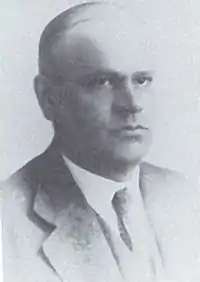Stanisław Ruziewicz | |
|---|---|
 Stanisław Ruziewicz (c.a. 1939) | |
| Born | 29 August 1889 Kołomyja (uk. Коломия) |
| Died | 12 July 1941 (aged 51) |
| Nationality | Polish |
| Alma mater | University of Lwów |
| Known for | Ruziewicz problem |
| Scientific career | |
| Fields | Mathematics |
| Institutions | Jan Kazimierz University, Academy of Foreign Trade in Lwów |
| Doctoral advisor | Wacław Sierpiński |
| Doctoral students | Stefan Kaczmarz |
Stanisław Ruziewicz (29 August 1889 – 12 July 1941) was a Polish mathematician and one of the founders of the Lwów School of Mathematics.
He was a former student of Wacław Sierpiński, earning his doctorate in 1913 from the University of Lwów; his thesis concerned continuous functions that are not differentiable.[1] He became a professor at the same university (then named Jan Kazimierz University) and rector of the Academy of Foreign Trade in Lwów.[2] During the Second World War, Ruziewicz's home city of Lwów was annexed by the Ukrainian Soviet Socialist Republic, but then taken over by the General Government of German-occupied Poland in July 1941; Ruziewicz was arrested and murdered by the Gestapo on 12 July 1941 in Lwów, during the Massacre of Lwów professors.[3]
The Ruziewicz problem, asking whether the Lebesgue measure on the sphere may be characterized by certain of its properties, is named after him.[4]
References
- ↑ Stanisław Ruziewicz at the Mathematics Genealogy Project
- ↑ Rossowski, Stanisław (1861-1940) Red (1932-06-08), Gazeta Lwowska. 1932, nr 128, retrieved 2022-07-20
{{citation}}: CS1 maint: numeric names: authors list (link) - ↑ Wacław Sierpiński, as quoted in Rotkiewicz, A. (1972), "W. Sierpiński's works on the theory of numbers", Rendiconti del Circolo Matematico di Palermo, Serie II, 21: 5–24, doi:10.1007/BF02844227, MR 0323676: "In July 1941 one of my oldest students Stanislaw Ruziewicz was murdered. He was a retired full professor of Jan Kazimierz University in Lvov, the last rector of Foreign Trade Academy in Lvov, an outstanding mathematician and an excellent teacher."
- ↑ Lubotzky, Alexander (2010), "2 The Banach–Ruziewicz Problem", Discrete Groups, Expanding Graphs and Invariant Measures, Modern Birkhäuser Classics, Basel: Birkhäuser Verlag, pp. 7–18.